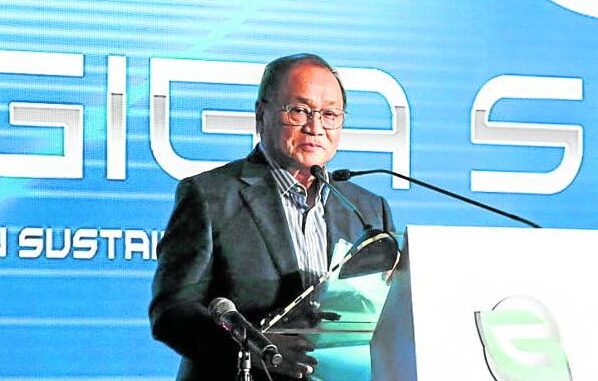MVP to Pinoy expat engineers: Come home to catalyze nuclear energy dev’t

REVERSE MIGRATION Manuel V. Pangilinan says overseas Filipino nuclear engineers need to return home to train local peers. —Contributed photo
Nearly four decades since the $2.3-billion Bataan Nuclear Power Plant was completed but never commissioned, a different sort of race has been taking place in the Philippines—with no clear victor just yet.
The start signal came last year in the form of President Marcos reviving plans of exploring nuclear power generation to address the impending surge in the country’s electricity demand and calling for a revisit of existing policies.
Pursuing dialogues with well-known nuclear power developers, particularly those based in the United States, was the first step for local companies.
But actual projects have yet to come to fruition, with key developers such as distributor Manila Electric Co. (Meralco) and Aboitiz Power Corp. still stuck at the starting point in the nuclear power race.
The key to emerging a victor, according to billionaire Manuel V. Pangilinan, is reverse migration. “We should entice Filipino nuclear engineers based abroad to return or at least engage us in an advisory role,” he says. “Apart from acquiring and building nuclear plants—the harder part of the business of nuclear—we do need to invest in the soft side of that business.”
Despite branding himself a “nonexpert” in nuclear power, Pangilinan, who chairs the country’s largest private power distributor, further explains on the sidelines of Meralco’s three-day Giga Summit event that the country needs trained engineers for the nuclear industry to be regulated properly.
Nuclear engineering is a highly specialized program that is scarcely available in the Philippines.
This is precisely why our nuclear engineers have to return home, Pangilinan says, and locally train professional engineers to finally drive nuclear power development.
Once an overseas professional himself, Pangilinan came back home after the Edsa Revolution, teaming up with the Salim group of Indonesia to acquire and turn around key businesses in the country from real estate to telecommunications, toll roads, water and energy utilities, power generation and hospitals.
Scholarship, internship
Meralco itself has been working on providing a training ground for aspiring nuclear engineers.
On Sept. 11, the company formally launched its Filipino Scholars and Interns on Nuclear Engineering (Fission) program, offering local engineers a chance to study nuclear development free of charge in the United States, Canada, South Korea, Japan and France.
The two-year graduate program scheduled to run from 2025 to 2027 targets graduates and practitioners in the fields of mechanical, electrical, materials and metallurgical engineering, as well as physics and other related disciplines.
But the training doesn’t end there. Fission is also set to include a yearlong immersion and internship program from 2027 to 2028 at the small modular reactor facilities of Meralco’s partners, including the Atomic Energy of Canada Ltd. and Ultra Safe Nuclear Corp.
True to Pangilinan’s “reverse migration” ambition, the Fission scholars will be sent home in 2029 under Meralco’s so-called Re-entry Action Plan.
“The scholars are expected to render their expertise to the company and to the Philippine government,” the company says.
Applications are set to begin next year, as Meralco has yet to finalize the qualifications and other details of the program that will send Filipino engineers to the University of California in Berkeley, the University of Illinois, Korea Advanced Institute of Science and Technology, the University of Ontario Institute of Technology and Université Paris-Saclay.
Challenges
Nuclear power development is not without its challenges. Pangilinan himself recognizes that concerns on safety remain, especially after the 2011 Fukushima and the 1986 Chernobyl nuclear disasters.
But these do not deter Meralco from setting its sights on becoming the Philippines’ pioneer in nuclear power generation.
Aside from the scholarship and reentry programs, Meralco aims to conduct feasibility studies with US-based developer Ultra Safe Nuclear Corp. to measure the viability of nuclear energy in the Philippines.
Once the results of the studies are out, Meralco plans to share these findings with the national government and major industry players to set in motion an alternative power generation process that Pangilinan says could deliver a better energy future for the Philippines.
“Hopefully, this is the start of exploring and considering seriously new options for this country to achieve a smarter and greener future,” Pangilinan says.
